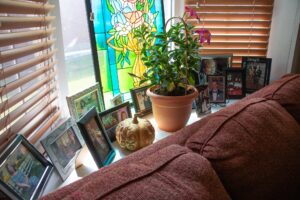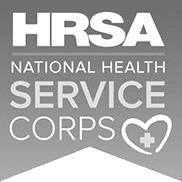In Connie Levandoske’s home, photos of family, symbols of faith and figures of autumn line the walls and make up the décor. They’re testaments to the ways she’s been shaped by her life’s journey and the seasons she’s witnessed — some bright, some dark.
Diagnosed with major depressive disorder at age 50 — which she believes first began in her late teens — Connie, now 75, has experienced a number of suicidal episodes along the way.

The latest occurred last August, two years after her husband of 54 years had passed away in June 2022 from COPD after battling cancer and a stroke.
“That’s been a very difficult time,” Connie says. “I think that was a big part of what contributed to my breakdown this time, was his death. I don’t think I had ever mourned him, really.”
Rather, Connie recalls, she “just got on with life” and did the things she thought she had to do.
It wasn’t long before Connie entered what she calls “the black hole.”
“With major depressive disorder, you can go into a really bad place all of a sudden,” Connie says. “Sometimes there’s a warning; sometimes there isn’t. … you just feel like you can’t get up out of it. You can’t pretend anymore. You can’t do the things that you normally do. You actually don’t want to do anything.”
Compounding Connie’s general diagnosis was an overwhelming feeling of loss.
“When I thought about my husband passing, I thought about all of my family that have passed,” Connie says. “It all just came to a head at once — everybody I have lost, and then I felt alone and lonely in this house by myself. And it just came together like that.”

Seeking support
Connie was in a difficult place, and it wasn’t the first time. She recalls when she first received her major depressive disorder diagnosis.
“I had lung surgery … [and] a very painful recovery period of six months,” Connie says. “And at the end of that time, I was severely depressed, severely depressed from all the pain and just … it was just hard to get up and around and move. And long story short, I knew I needed help because I was in that black hole.”
She called for an appointment with a psychiatrist and was told there was a wait period. But Connie knew she had no time to wait.
“And I said, ‘Well, that won’t do me any good because I won’t be here then.’ And the receptionist said, ‘Are you saying what I think you’re saying?’ And I said, ‘Yes, I am.’”
After being seen that first time, Connie continued to identify the professional supports that could assist her when needed.
She learned to open up. And she learned better ways to cope.
“They gave me different ideas on how to handle situations that I would find myself in a lot,” Connie says. “And they made me feel like I was not the only one that ever went through this or ever had been through this.”
So, when Connie found herself in her depressive situation two years ago, she sought help from a trusted voice she’d heard for 10 years.
“I actually had an appointment with Denise [Stutes] at Optimae the day that I admitted myself,” Connie said. “I, at that point, was seeing her every two weeks, and she saw that I was not in good shape. … She said, ‘Connie, I’m sorry.’ She said, ‘I think you need help and I think you need to admit yourself.’ And so that’s what I did.”
Connie stayed two days and one night. She reached back out to Denise.
“She comes back into the picture, and she says, ‘OK, we’re going to have to see each other once a week and I’ll be keeping a close eye on you.’”
Connie remained on suicide watch for a month.
“I just felt like I did not want to be here,” Connie says. “So, when you start, especially when you start feeling like that, you’ve got to have help. … go to the ER, go to the hospital. Don’t wait. Go.”
For Connie, Denise has been a major part of the help she’s received.
“We have a very good rapport. We get along well. … I told her every single thing about my life … and that was the first time I had ever done that, because I had left chunks of my life out because I was ashamed of them.”
To combat Connie’s shame and regret, Denise provided hope.
“She said, ‘Connie, now that you’ve done that … you don’t have to feel ashamed about that anymore. You’ve told us everything there is to know about you. You’re a Christian. You’re forgiven. That part of your life is over and done with. … We’re just going to get on with it.’”
And Connie has.
“It has been a journey,” Connie says. “I have a long journey as far as medication-wise. And just getting to the point where I feel like I have an excellent counselor. … Denise, I know I can call anytime. … And I know that, and that makes me feel safe.”

While Connie feels safe, there are still moments of instability.
“I’m still not where I want to be,” Connie says. “I just, some days I just feel numb. There’s no other word for it. I just feel numb — I’m not happy, I’m not sad, I’m just kind of here. And then other days I feel better than that. And other days I feel worse than that.”
Progress with a purpose
As Connie navigates the up-and-down moods associated with mood disorders, she forges ahead, believing that purpose is what will see her through.
“I need a purpose,” Connie says. “God gives everyone a purpose. And if I can help anybody in any way, I feel like that’s what I’m meant to do.”
Connie is finding those ways to help, including once serving on Optimae Behavioral Health’s advisory board and researching the requirements to offer formal peer support.
“I’m not where I need to be,” Connie says. “But that doesn’t mean I still can’t talk to someone about what they’re going through and maybe give them a few helpful hints to make them feel better about themselves.”
Driven by that purpose and passion, Connie offers this advice:
“When you’re in that black hole, you don’t feel like you’re ever going to get out of it — like there’s nothing, no way you’re ever going to feel any better. And so that’s my passion. I don’t want anybody to feel like that.”
And, if someone does?
“If you feel like you’re not right, if you’re having problems, if you’re feeling sad and depressed and all that, get help right away. Do it as soon as possible. Because I went all those years just thinking, ‘OK, I’m moody. I, you know, act this way sometimes or I feel that way sometimes.’ Get help right away. And get better.”
If you or someone you know is contemplating suicide, help is available. The National Suicide Prevention Lifeline (988) is a free, confidential resource for people wanting to talk. Take care of a friend, a loved one or yourself. Call, text, or chat with a 988 Lifeline counselor for assistance during difficult moments anytime, day or night.












